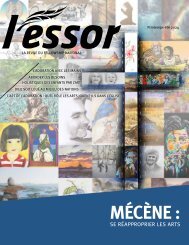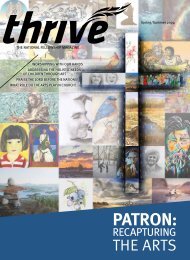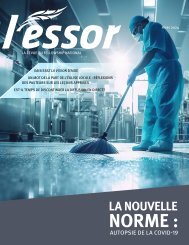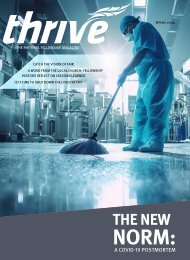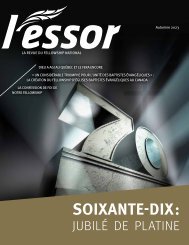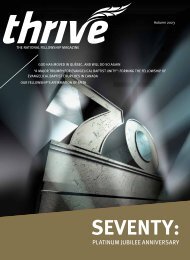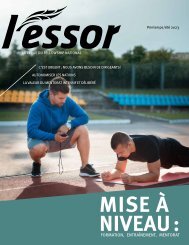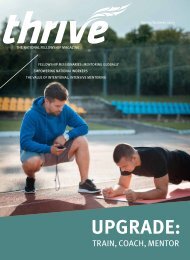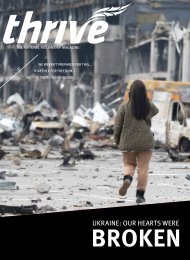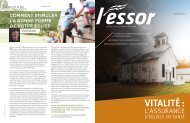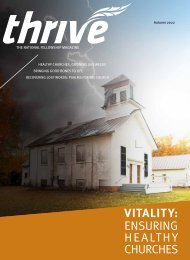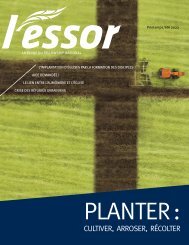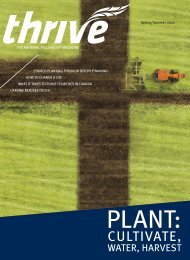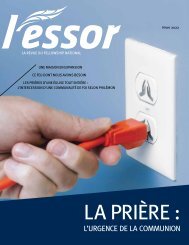Thrive_Autumn 2019 digital issue
MARGIN Rhythm and Pace
MARGIN Rhythm and Pace
- No tags were found...
Create successful ePaper yourself
Turn your PDF publications into a flip-book with our unique Google optimized e-Paper software.
thrive-magazine.ca<br />
thrive / 9<br />
IF WE CAN FIRST RESTORE THEIR RELATIONSHIP<br />
WITH THEMSELVES, ALLOWING THEM TO<br />
IDENTIFY AS BELOVED<br />
SONS OF GOD, FROM THERE<br />
OTHER RELATIONSHIPS ARE RESTORED AND<br />
BEHAVIOURS BEGIN TO CHANGE.<br />
times people will try to change the symptoms (behaviours)<br />
without tracing it back to the root. We need to deal with the<br />
heart of the matter before we can break people free from the<br />
behaviours that accompany it. Everything drives back to the<br />
questions, “Where does my identity lie? Am I resting in my<br />
identity given by God?” I try to change relationships, not behaviour—relationships<br />
with others, with self, and with God.<br />
Romans 13:8-10 tells us that every single sin is a lack of love<br />
and hurts a relationship; therefore, every change God asks of us<br />
will be a relational change. If we can first restore their relationship<br />
with themselves, allowing them to identify as beloved<br />
sons of God, from there other relationships are restored and<br />
behaviours begin to change. I’m so passionate about this topic<br />
that I wrote a book (in Spanish) about what relational theology<br />
looks like, called Connected.<br />
What are the most common barriers you face when mentoring in<br />
this way?<br />
Many times the men that I mentor are resistant to getting as<br />
emotionally close to me as necessary. Without honesty and<br />
vulnerability, the relationship can’t achieve what it needs to<br />
in order to see meaningful character refinement. It’s also very<br />
hard for people to look at their own pain and unresolved <strong>issue</strong>s.<br />
They may have been hurt in the past and feel reluctant to<br />
let someone new get close to them. Another drawback is the<br />
time-consuming nature of working in one-on-one meetings: it<br />
means that I have to pull back on programming to spend time<br />
with each individual. It also requires a lot of spiritual and emotional<br />
investment, as we tackle many difficult <strong>issue</strong>s, and there<br />
is an element of moving into unknown territory—there are no<br />
guaranteed outcomes!<br />
How have you seen God at work?<br />
Seeing God transform people when they understand their<br />
true identity as children of the Most High is easily the most<br />
rewarding transformation. In John 17:23, Jesus asks God that<br />
“the world may know that you sent me and loved them even as<br />
you loved me.” When we can grasp that fact, we’re on our way<br />
to embracing our God-given identity. I have also seen God deal<br />
with not only guilt, but shame, which is more identity-based<br />
than guilt, as it distorts a person’s perception of themselves.<br />
When shame is lifted, people experience freedom to move into<br />
areas of ministry that they were afraid of previously. I have<br />
seen many pastors finally become vulnerable, and many who<br />
overcome sexual addictions by embracing their identity as<br />
children of God.<br />
MY IDENTITY LIE?<br />
IDENTITY GIVEN BY GOD?”



